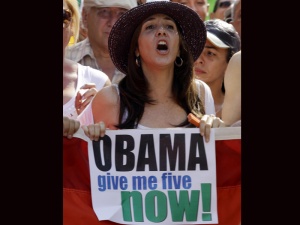“La primera vez”: Mariela Castro’s pseudo-historic “No”
by fpman
Here at the Patrimony we are not subject to the Chinese government’s ongoing attempt to teach journalists “to learn Marxist news values,” and thus, in our ideologically underinformed state, we cannot quite decide if the following piece of news qualifies as revolutionary, counter-revolutionary, or neither of those, in terms of classical socialist doctrine.
The link goes to an article in Spanish, the greatest part of which you can read here in English.
In short: Mariela Castro, Raúl Castro’s daughter, and consequently Fidel Castro’s niece, has recently voted no on proposed labor legislation in the Cuban parliament, in la Asamblea del Poder Popular — the Assembly of People’s Power that is powered by people who say yes to everything twice a year. In case you were worried as to what this might mean for labor code modernization in Cuba, the legislation safely passed, in spite of this very noteworthy resistance. Mariela Castro’s “No” was a lonely No, not only on the given day but historically speaking, too. A first-time No in the assembly. And that is of course the revolutionary aspect of all of this. Or a counter-revolutionary aspect of this… Or… let’s try to understand this a little more.
Here’s a photo of Mariela, demanding release of the Miami Five as they are known in Cuba, from US President Barack Obama — and then here’s a bit of background on her, too.
 Mariela Castro (photo: Javier Galeano, AP)
Mariela Castro (photo: Javier Galeano, AP)
Even as Mariela has her list of demands for President Obama, she is known as the one member of the Castro family who openly says she would vote for him in US presidential elections. This is largely related to her views as an LGBT activist, and her way of supporting Obama’s stance on gay marriage. She is also the odd one out in the family having travelled to the US in the past to attend a conference of the Latin American Studies Association in San Francisco, in 2011. She is a scholar, after all, and she has published several articles in the Cuban journal Sexology and Society, as president of the Cuban National Centre for Sex Education.
In fact, the recent, historic “No” comes connected to Mariela’s activism. She voted the way she did because she was apparently concerned that the new labor law does not provide protection from discrimination to people who are HIV positive or have atypical gender identities.
Now ain’t that nice. However, if one goes all philosophical about this, there is more to the problematique of this parliamentary-familial mini-revolt to polemize about than an implicit clash of traditional and new leftist thinking and core values. Some observers claim that the new Cuban labor law to which the people’s power has given its seal of approval so eagerly, minus the one person in question who didn’t, is actually exposing private sector employees as a relatively weakly protected segment of the labor force. In a country where the private sector is growing.
Given that the one person who said “No” voted the way she did for reasons unrelated to this, yet framing her actions as a stance in favor of what by implication would be an “even more impeccable” labor law than the one presented as good enough for a socialist country, one gets the impression that this “No” is, well, a semi-tolerated, semi-sanctioned one — one that is meant to legitimize rather than de-legitimize.
And yet a first is a first. A case of organized spontaneity this may have been — it may still be followed by more actual spontaneity.